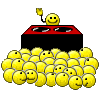Great topic & great info! FYI: Wiki has a pretty good writeup on the loudness wars, too...
http://en.wikipedia.org/wiki/Loudness_wars
(I think this is probably the fifth or sixth time I've posted that link...)
Initally, digital mastering was meant as a way to reduce background recording hiss that can become apparent during very quiet passages of the music mastered on analog tape. That's why digital mastering in it's early stages was used mostly for classical music, played acoustically and recorded via very elaborate microphone setups.
It's no surprise to me that the flash example uses that Dire Straits CD from 1986 as it was one of the first ever commerical Pop/Rock releases that carried the DDD mastering symbol, indicating that was 100% digitally mastered from start to playback. That was a huge deal in the music and stereo magazines back in the day. So, that is definitely an example of comparing what is done to the master digital recording after-the-fact back then, versus how they tend to master music now.
Where it gets really tricky is when you try to compare a really good analog master vs. a digital reproduction. And I think the only way to do that is really to sit down in front of a well tuned turntable system and listen to a pre 1986 record and compare it to the latest "remaster" of that via CD. You can even digitize an old recording youself and "normalize" the audio file for a similar effect. Yuckety-yuck-yuck!
I've done exactly that with some of my DJ buddies when we had this same type of conversation... listening to the same music that I happen to have on vinyl, CD and MP3. I've actually done this several time, but most recently with Prince's Purple Rain. To take that a step further, I even recorded the vinyl track onto audio cassette and HiFi VHS and we conducted blind tests. I controlled what source was playing and my buds had no idea what was playing... they just told me what source they thought sounded the best. The HiFi VHS recording received highest praise, followed closely by the actual record and the cassette tape (which were basically tied thanks to well tuned Nakamichi deck). The CD finished next-to last, ahead of a clean 196kps MP3, and miles ahead of a 128kps normalized MP3 version.
I should mention that we didn't compare any of that on actual boomboxes and the soundsystem I have to do this kind of comparison is not what most would consider the norm, but the point I'm trying to make is that analog simply has a more airy and alive feel to it, at all levels. We all liked analog best, and after it was all done we played the HiFi VHS version from start to finish, just because they wanted to hear it that way in its entirety.... It was a fun experiment and an easy way to kill a 12-pack!
I totally agree with the comments about how music nowadays seems to rely more on bass than ever before, especially in modern pop and R&B. That' wouldn't be a bad thing if shoddy mastering and compression wouldn't cause the treble detail to suffer dramatically or disapper completely. To me, for the most part sound engineering seems to have taken more steps backwards than forwards over the years. And many musicians seem to have taken notice of this as well, which is why you are seeing a resurgence of artists insisting on analog mastering and / or the use of no dynamic range compression at all in their mastering. Well, at least those who know the difference, anyway.
But, getting somewhat back to the original topic, if you want to make modern music sound better on an oldschool boombox, I challenge you to record your new tunes onto tape and then give it a listen... The odds are that your box won't even try to record the ultra-low sounds (since it can't) and then your box won't go nuts trying to reproduce them. Just be careful with your levels and don't push them too high. You might be pleasantly surprised by the results.













